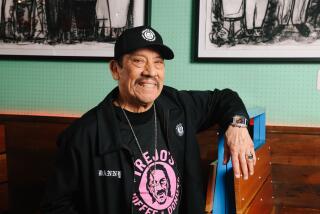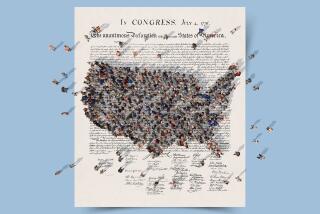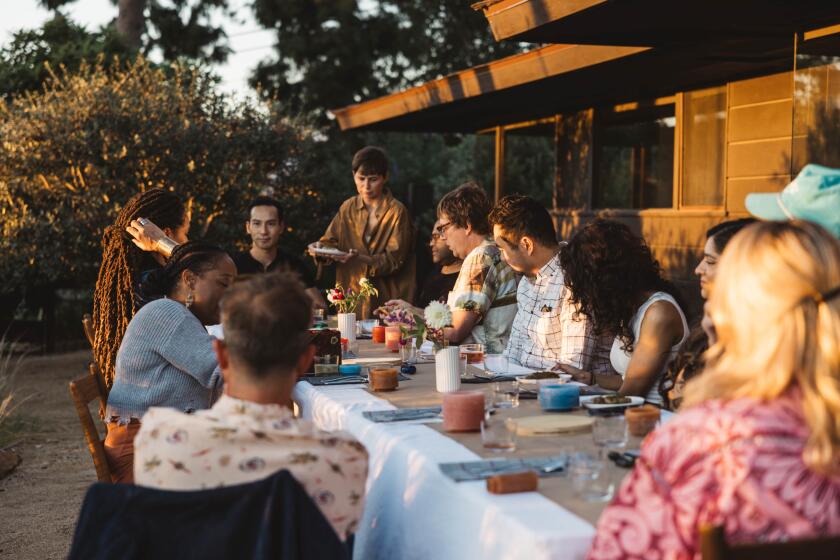Thomas Jefferson Declared Under the Influence
I have received a complimentary copy of a magazine called Heads Up, a publication of the Beer Drinkers of America.
If all the beer drinkers in America are members of that organization, it must be very large indeed, and very powerful politically. It is more likely, I suspect, that its members are in the brewing industry.
I do not qualify, by habit, for membership (I generally drink wine), but I am amused by the industry’s pretensions to patriotism. The cover shows three men in Colonial costume examining a document written on parchment. They are in a tavern before a great fireplace. Their table holds two full beer mugs and one lighted candle. In the table of contents it is noted that this scene was “re-created” in Gulliver’s restaurant in Irvine.
I am always glad to learn some previously unknown tidbit of American history, so I was surprised but not displeased to learn in an article called “Ye Old Public Taverns Were a Source of Inspiration, Warmth . . . and American Liberty” that Thomas Jefferson actually wrote one of his drafts of the Declaration of Independence in a tavern.
Not only was he in a tavern, he was drinking ale. I quote:
“Thomas Jefferson sat at the Indian Queen Tavern in Philadelphia facing a blank sheet of parchment. Taking a long drink of his freshly poured ale, he touched his pen to paper and scratched, ‘When in the course of human events . . . . ‘ “
It is fascinating to think that Jefferson may have been a little tipsy when he wrote that most cherished of American documents. Perhaps the ale accounts for his misspelling of “inalienable” as “unalienable,” an error that has been perpetuated in copies of the declaration to the present day. It is said that Jefferson in his other writings spelled the word “inalienable.”
We may also wonder whether it was the ale, and the tavern setting, that caused Jefferson to omit women from his phrase, “We hold these truths to be self-evident; that all men are created equal. . . .”
In his biography, “Jefferson the Virginian,” Dumas Malone notes that in his original draft Jefferson had written “We hold these truths to be sacred and undeniable,” but this rhetorical flare-up was toned down later, either by Jefferson himself or by Benjamin Franklin.
Nevertheless, though Jefferson may have been under the influence of ale when he composed it, his declaration has stood the test of time. As Malone says, “No other American document has been read so often or listened to by so many weary and perspiring audiences. Yet, despite interminable repetition, those well-worn phrases have never lost their potency and charm.”
Certainly a close second to the declaration would be Lincoln’s “Gettysburg Address,” which he wrote on one sheet of paper before leaving the White House for the cemetery. He made some revisions the night before the talk. Oddly, the phrase “under God,” in “this nation, under God, shall have a new birth of freedom,” did not appear in his original copies. He ad libbed them. But they appear in all subsequent copies. One thing I doubt seriously, is that Lincoln had drunk any beer or spiritous liquor while he was composing it.
Heads Up also notes that the flag that inspired Francis Scott Key to write “The Star-Spangled Banner” in 1814 was sewn by Mary Young Pickersgill on the floor of a Baltimore brewery.
In an article on “America’s No. 1 Song” (Atlantic, July, 1986) Daniel Mark Epstein explains that Mary’s sewing room was too small for the flag, which was 30 feet high and 42 feet wide, so she and her little daughter worked on their hands and knees on the malt-house floor of Claggett’s Brewery. They finished just as the British fleet was approaching Baltimore Harbor.
Key was a prisoner of the British during that night of rockets red glare and bombs bursting in air, and at dawn, when he saw the flag still flying, he wrote his poem on an envelope.
Not only was the flag sewn on a brewery floor, but the poem was set to the tune of an English drinking song, “To Anacreon in Heaven,” a hymn to the ancient Greek poet Anacreon, who loved wine and lovemaking above all else. London gentlemen spent nights of alcoholic singing and revelry in his memory.
According to Heads Up, Key’s words were published on a handbill the next day and were soon “being sung in Baltimore taverns.”
So “The Star-Spangled Banner” is a dubious national anthem, not only because of its libertine origin, but also because of its notoriously out-of-reach high notes and low notes, on which the best voices--pop, operatic and rock--routinely founder; also, it can not be marched to.
I don’t drink beer when I write. If I did, I’d probably write phrases like “We hold these truths to be sacred and undeniable.”
More to Read
Eat your way across L.A.
Get our weekly Tasting Notes newsletter for reviews, news and more.
You may occasionally receive promotional content from the Los Angeles Times.










